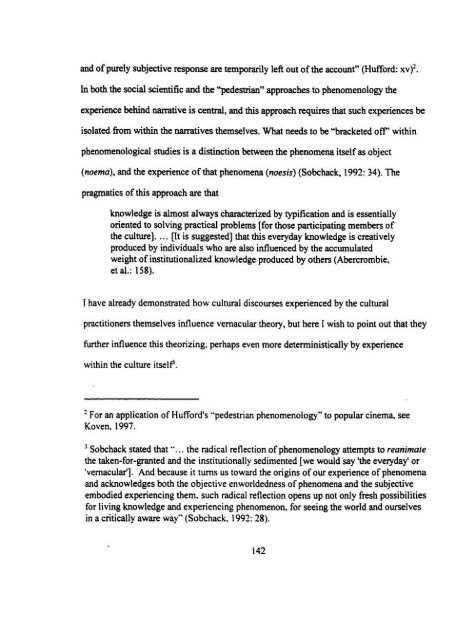Untitled - Memorial University of Newfoundland
Untitled - Memorial University of Newfoundland
Untitled - Memorial University of Newfoundland
Create successful ePaper yourself
Turn your PDF publications into a flip-book with our unique Google optimized e-Paper software.
and <strong>of</strong>purely subjective response are temporarily left out <strong>of</strong>the account" (Hufford: xv)1.<br />
In both the social scientific and the "pedestrian" approaches to phenomenology the<br />
experience behind narrative is central, and this approach requires that such experiences be<br />
isolated from within the narratives themselves. What needs to be "bracketed <strong>of</strong>f' within<br />
phenomenological studies is a distinction between the phenomena itselfas object<br />
(noeMa), and the experience <strong>of</strong> that phenomena (noesis) (Sobcllack, 1992: 34). The<br />
pragmatics <strong>of</strong>this approach are that<br />
knowledge is almost always characterized by typification and is essentially<br />
oriented to solving practical problems [for those participating members <strong>of</strong><br />
the culture).... [It is suggested) thaI this everyday knowledge is creatively<br />
produced by individuals who are also influenced by the accumulated<br />
weight <strong>of</strong> institutionalized knowledge produced by others (Abercrombie.<br />
etal.: 158).<br />
I have already demonstrated how cultural discourses experienced by the cultural<br />
practitioners themselves influence vernacular theory. but here I wish to point out that they<br />
further influence this theorizing. perhaps even more deterministically by experience<br />
within the culture itself!.<br />
1 For an application <strong>of</strong> Hufford's "pedestrian phenomenology" to popular cinema. see<br />
Koven, 1997.<br />
} Sobchack stated that ..... the radical reflection <strong>of</strong>phenomenology anempts to reanimate<br />
the taken·for-granted and the institutionally sedimented (we would say 'the everyday' or<br />
·vemacular]. And because it turns us (oware! the origins <strong>of</strong> our experience <strong>of</strong> phenomena<br />
and acknowledges both the objective enworldedness <strong>of</strong> phenomena and the subjective<br />
embodied experiencing them. such radical reflection opens up not only fresh possibilities<br />
for living knowledge and experiencing phenomenon. for seeing the world and ourselves<br />
in a critically aware way" (Sobchack. 1991: 28).<br />
142

















